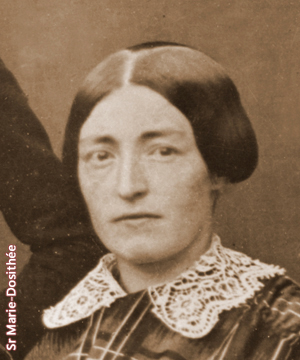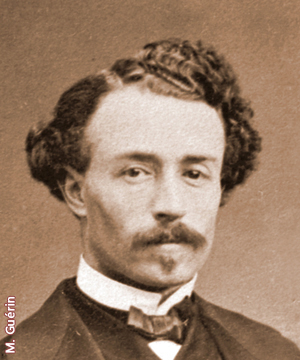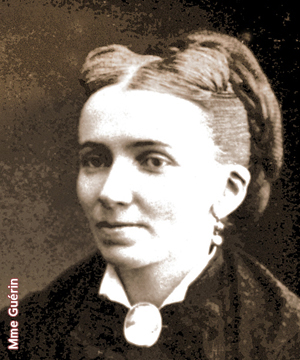From Sister Marie‑Dosithée to Mr. and Mrs. Guérin. February 11-13, 1872.
V. + J.
From our Mother of Le Mans
February 11, 72
Dear Brother and dear Sister,
I see with happiness that you are better my dear Sister, your letter made me all the more happy that I was in deep concern about you, finally I hope that the Lord will allow himself to be touched by our prayers and will restore you to perfect health. You ask me if you can write to me during Lent: yes, if you need to, but I will not answer you unless there is a great need. Isidore always tells me that I do not write often enough, however I do not leave a letter unanswered, you understand that I cannot write indiscriminately, without knowing your need and your current state unless I make a sermon what I don't want to do, not understanding anything about it and being irrelevant when I don't know what can be useful to you; but an answer is something else, here I am speaking to you with an open heart and without looking for much, I assure you, the affection I have for you does not give me the thought of looking far for what I have. to tell you and likewise the one you bring me makes me count on your indulgence, convinced that if I tell you something that I shouldn't perhaps, it's not ill will but often too much interest in everything what concerns you. [1v°] I hope to see you after Easter, I do not believe that the unfortunate events with which we are threatened have begun (the prediction of a catastrophe for July 1872 particularly worries Mme Martin); do not be afraid for me, for those who trust in the Lord will not be shaken any more than Mount Zion (Ps 124, 1), he keeps us and we are more confident under his protection than if all the universe was armed for our defence, rest assured that if you put your trust in him nothing bad will happen to you; you will see evils falling right and left without reaching you. God loves with an extremely tender love those who abandon themselves to him and the mother does not have so much tenderness for her little child as the Lord has for the abandoned soul, believe me, pray a lot yes a lot, do good, trust in God and fear nothing. Like you, we have seen the aurora borealis and I believe that it is the announcement of new misfortunes; last year, during the invasion of the Prussians, a somewhat similar one appeared.
My dear Sister, allow me to speak to you in confidence and quite simply to respond to the naive confidence that you show me in your kind letter: Yes, you torment yourself far too much, and like you, I think that the state of your health there contributes a lot, but believe me, fight against this disposition, you need a lot of energy, I believe that the good Lord asks you to work on this side, because it is not enough to do the well yourself, but you have to apply yourself with all your might to have those around us do it and your position as [2r°] mother of the family and mistress of the house demands it. Your children will have faults to correct and to faithfully fulfill your duties towards them you must overcome a very legitimate tenderness, and a tendency by character not to oppose difficulties, but to yield to them too easily because of the fight that a struggle engages naturally; you see not everyone has as good inclinations as you and certain strong and vigorous natures like your little Jeanne seem to me to be, demand work which in the end bears very delicious fruit, but left without cultivation this land does not would only produce thorns. As mistress of the house, you have a real apostolate to fulfill; the Christian and strong woman works an unimaginable good around her. You will certainly have many trials in life, you must always overcome them by the calm and the strength of your virtue and for all that what must you do? pray a lot and then stand firm on all occasions when it is required to show oneself without giving way to the inclination of nature; in trials to see the designs of divine Providence and (the) paternal hand of our good God and Savior who wants by such means to fill us with goods infinitely more precious than the miserable goods of this world.
The little girls were very happy to receive a little letter; they are well and will be good, I believe. My little Marie is ravishingly candor, simplicity and frankness. Pauline is going to prepare to make her 1st communion (July 2, 1872). Léonie for the short time that I had her (June-July 1871), gave me good hope for [2v°] the future. She is a difficult child to bring up and whose childhood will give no pleasure, but I believe that for the future, she will be better than her sisters. She has a heart of gold, her intelligence is not developed and is well below her age, however she does not lack means and I find her to have good judgment; with that an admirable strength of character; when this little one is right and she sees her duty, nothing will stop her, the difficulties, however great they may be, will be nothing for her; she will break all the obstacles that will not fail her in her path because she is built for that, finally she is a strong and generous nature and completely to my taste but if the grace of God were not there, it would be A....... . .?
Before God natures do nothing, wolves by grace become lambs and lambs become intrepid like lions, the whole thing is to overcome oneself, which is very difficult work, but possible; and each has its difficulties, each natural virtue has its opposite which must be energetically repressed with the help of grace and prayer, not to be discouraged and after each fall get up and start again, and God seeing our good will will help us and we will happily arrive at the port.
I must tell you about a marvelous ivory crucifix of about 50 to 60ces (inches?) that we saw last week: it is a masterpiece! I considered it for maybe two minutes, but that's enough, not to make me admire the art [3r°] but the love of our God, you couldn't consider it for long without bursting into tears when you see the immense love of the Creator for his guilty and rebellious creature. We get used too easily to the thought of the death of a God, we have been brought up in this knowledge, it no longer strikes our imagination and if we do not meditate on this astonishing mystery we find it almost as natural; also it seems to me that one of the greatest pains of the Savior in his passion was to see the indifference of Christians towards him, he read into the future, he saw with what ingratitude we would refuse ourselves to the smallest sacrifices and that what bothers us the slightest bit would be a sufficient reason for neglecting our duties. So I saw it! eyes raised to Heaven, he is about to expire what a look! what pain ! the inner agony is admirably painted on his face, which is all resplendent with divinity; love, indulgence, forgiveness are painted in this last look, his joys [cheeks] are covered with horrible wounds from the slaps he received, his mouth opened with inexpressible pain is full of blood, his tongue desiccated clings to his palate, he utters a last prayer. Finally, I cannot describe to you the beauty, the love and the pain united in this admirable masterpiece, so I am sending you the description and the verses herewith; which these were made by a nun.
I leave you leaving you my crucifix for your Lenten meditations and recommend myself to your prayers, I am well and will pray for you.
Your loving sister
Sr. M. Dosithee Guérin
From the Von Ste Marie.
D.S.B.
Kiss the dear little ones for me. [3r° tv] If you want to be good enough to send me stamps as you offered.
(The postscript concerns Mr. Guérin, as does the address of the letter, on the back of this sheet.)
[4r°] The Christ of Charles‑Quint
Excerpt from the Journal des Beaux-Arts (fragments)
Here genius and faith united in a magnificent dash and produced such a work that, contemplating it, the imagination wonders if it is very possible that human hands worked this ivory, passed in some way to the state of living and moving matter. . .
Christ is going to die; his head raises towards the sky where his eyes still cast a glance; his mouth cries out the last words. The data is as simple as known; artists have been dealing with it for nearly 19 centuries, and suffering humanity has been steeped in this unspeakable agony. Well. No one has felt and understood it like the unknown author of the Christ of Charles V. . . See the fingers of the hand, their relative suppleness, their contraction, the play and the mechanism of the small muscles, the phalanges thinned towards the middle and swollen towards the ends, the delicacy of the attachments of the wrist with their stiffened but still living tendons, the softness of the pose and the large muscles of the neck, the emaciation of the nose contracting at the approach of death, the eye going out but raising its pupils one last time, the open mouth from which one believes one sees emerging the damp veil of breath. . .
. . . The mid-body tunic is of Renaissance-smelling drapery throw; the head belongs to nothing that one can imagine. It is the most beautiful type and the most conformable to the traditions that can be met.... . .
Streaks of blood crisscross the body throughout its length, but nothing leads to disgust or terror. There are, however, in this representation, details of a terrible truth. The coagulated blood on the knees and hands is rendered by flat, matte rubies, having the appearance of a bloody callus that borders on the most brutal realism. One would be tempted to reproach this kind of detail to the artist, if the harmony and the perfection of the whole did not say in advance that this criticism could not be founded. It is evident that the superiority of the genius of the author of this Christ imposes itself solemnly on our reason, like those supreme arguments which, in nature, force man to bow down and admire.
To complete I add the verses made by a nun after having contemplated this Christ.
[4v°] 4. You traced me, Holy and divine Image,
The tortures of the body, the torments of love;
Through you I understood everything, his death was my work
What can I not at your feet expire in my turn!
12. Go then, O God Victim, where your love calls you
Subjugate both pride and error,
Calm repentance, charm the faithful heart,
Confuse in arms the just and the sinner.
118*
20. Oh! Give me the cross; it's my only wealth
This is all my treasure, O holy poverty.
On my failing heart, that I always press her
To give it back to you on the day of your eternity.





